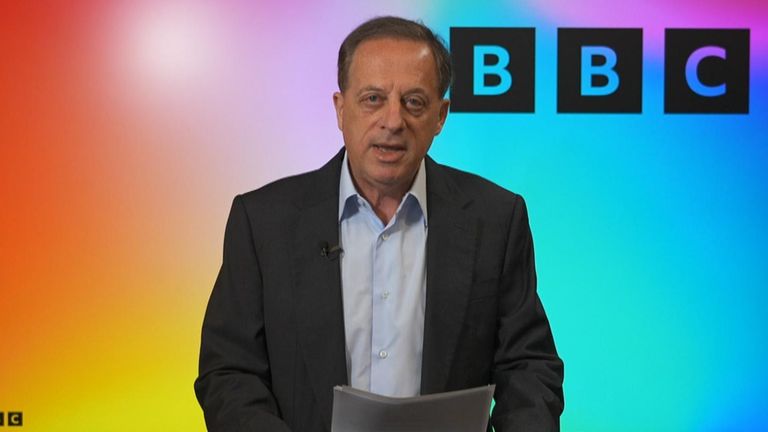After three months of refusing to leave, Richard Sharp succumbed to what was perhaps inevitable.
His carefully choreographed TV statement was recorded before the report was even published, and he avoided the need to do an interview.
Mr Sharp has, therefore, not been held to account about the damage his behavior and this whole row has had on the BBC’s reputation.
If there was one point Richard Sharp hoped to make in his statement, it was that his appointment was valid.
That, he suggested, was the key finding of the report by Adam Heppinstall. Yes, there was a breach of the governance code, but not one that made his position untenable.
He claimed the breach was “inadvertent”, but notably, the KC did not make a judgment on that point. Mr Sharp’s key message seemed to be that his departure from the corporation was of his own choosing.
But the detail of the report published by the commissioner for public appointments draws that framing into question.
Politics Hub: Latest reaction to Richard Sharp’s resignation
Richard Sharp has jumped, but had he not, it is very possible he would have been pushed.
Culture Secretary Lucy Frazer said she “respects” Mr Sharp’s resignation, perhaps partly because it means she has avoided having to make a difficult decision (the BBC charter says it is up to her to remove a chair in consultation with the BBC board).
Ultimately, Rishi Sunak would likely have been the final arbiter over Mr Sharp’s future, a potentially awkward situation since Sharp was once the prime minister’s boss during his time at Goldman Sachs.
This – like the privileges investigation into Boris Johnson – is yet another example of how that former PM’s behaviour is still causing problems for one of his successors.
Mr Johnson’s finances (or rather the lack of them) is the reason Sam Blythe approached Mr Sharp in the first place.
Labour and the Liberal Democrats have attempted to use this saga to feed into a narrative of Conservative sleaze and cronyism. Such punchy political responses are unsurprising six days ahead of local elections in England.
Read more:
Just 800 of estimated 4,000 EU laws to be scrapped by year’s end, MPs told by minister
Parliamentary standards watchdog extends investigation into PM over second possible breach
Shadow Culture Secretary Lucy Powell argues Mr Sharp should have been sacked weeks by the PM weeks ago.
But the BBC chair has long been a political appointment, and Labour governments have appointed Labour supporters to the role in the past.
Mr Sharp will remain in post until June 27 when an acting chair will take over. The process to find a permanent replacement is likely to be rigorous and subject to much media scrutiny.
The proposed final candidate for the £160,000 a year role will also face a grilling by the culture select committee, which has been so critical of Richard Sharp’s conduct.
Today the BBC chairman has resigned to minimise damage to the corporation’s reputation. Some argue he could have done that far better by making the same decision three months ago.

